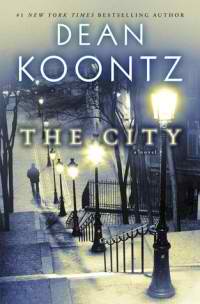
Published by Bantam on July 1, 2014
All great cities have a soul. At the age of eight, Jonah Kirk meets a woman who tells him she is the soul of the city made flesh. Jonah calls her Pearl. He introduces the reader to Pearl when, at 57, he starts dictating the book we are reading. Jonah attributes the appearance of new piano in the community center (and thus the beginning of his career in music) to Pearl, whose connection to the supernatural is immediately apparent to the reader, if not to young Jonah.
Despite the supernatural elements that you would expect in a Dean Koontz novel, The City is not the kind of story that Koontz typically tells (a fact that may disappoint Koontz fans). The City is a tale of crime and conspiracy, but I liked it less for its moderately engaging plot than for its cast of fully developed characters. Among other topics, the early chapters of The City recount Jonah's love of his mother and grandparents and his difficult relationship with his (mostly) absentee father. The occasional appearances of Jonah's father build a sense of dread, as do the dreams that sometimes trouble Jonah's sleep. One is about a dead girl named Fiona Cassidy. Another is about Lucas Drackman, who murdered his parents. Not unexpectedly, both figures make threatening appearances in Jonah's life. Perhaps the dreams are prophetic, but prophecies are easily misinterpreted. Still, this is a novel that builds characters more than it builds suspense.
Courage and heroism are among the novel's driving themes. The City reminds us that those qualities are exhibited by ordinary people every day. "And one form of heroism," Koontz writes, "is having the courage to live without bitterness when bitterness seems justified, having the strength to persevere when perseverance seems unlikely to be rewarded, having the resolution to find profound meaning in life when it seems the most meaningless." Courage is, in part, the ability to overcome adversity and fear, but it is also the ability to overcome anger and guilt -- a wise lesson the novel teaches repeatedly.
To an even larger extent, The City is about the power of friendship. When Jonah needs help understanding the evil that has entered his life, he turns to the Japanese-American tailor in his building who has become his friend. The tailor enlists the help of his own friends, who seek help from their friends, and so on, each acting solely from the desire to help a friend. Another key character is Malcolm Pomerantz, a child prodigy with the saxophone who becomes Jonah's lifelong friend at the age of ten. Malcolm is a misfit but his beautiful older sister is the personification of grace and sweetness. She is white, Jonah is black, but (like Malcolm and the tailor and Jonah's grandfather) she does not view race as a barrier to friendship.
A related theme of The City is the power of kindness. Many of Koontz' characters (from neighbors to cab drivers to victims of Japanese internment camps) are exceptionally (perhaps unbelievably) kind. It is a way of life for them to do good and unselfish deeds for others, friends and strangers alike. Kindness, Koontz seems to be saying, is the antidote to evil, even if it cannot shield us from evil acts or tragic events. And if the goodness and generosity of the characters makes them difficult to believe, I think Koontz intended them as archetypes, as models of the people we should all aspire to be.
Koontz establishes the time (mid-1960s) and place with great clarity. The focus, of course, is on historical events that increase the novel's atmosphere of dread: race riots, serial murders, bombings, and other violent episodes contribute to the reader's sense of unease. Balanced against that chaotic environment is chaos of a different sort, expressed by Jonah's love of music, from the jazz standards that his mother and grandparents extoll to the Beatles, Dylan, Motown, and the explosion of artists and musical forms that characterize the time. The City might not appeal to readers searching for a strong, plot-driven narrative, but even if The City told no story at all, it would be a joy to read for its evocation of a tumultuous and musical decade. It is made all the better by the moving moments in the story it tells and by its memorable characters.
RECOMMENDED